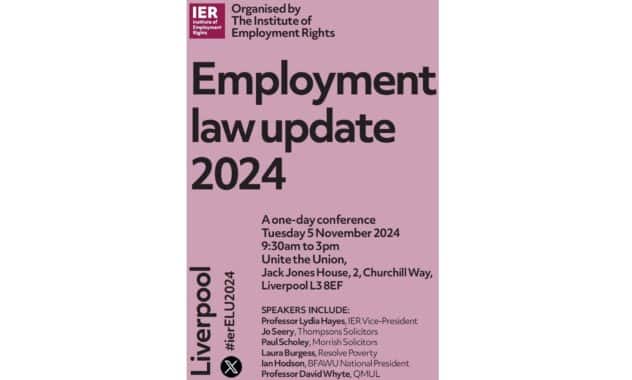Employment Law Update 2019 – Liverpool
A report on our recent conference covering changes to employment rights in 2019.

Conference report
I have been to many conferences at the Institute of Employment Rights and I have always found them informative, thought provoking and creates discussion amongst the attendees.
Today’s conference, which I was fortunate enough to attend, was the Employment law update 2019. This has to be the best attended conference I have attended at the Institute of Employment Rights, with every seat in the venue taken. Those of us that attended, both old and new, were not disappointed in the content or the speakers. Unfortunately one of the speakers had to pull out at the last minute taking the number of speakers from six to five, but this didn’t detract from what was an excellent conference.
James Harrison, chairing the conference gave an overview of the day and gave an update on forthcoming events and literature from the IER: information regarding these can be found on the website.
Unfair Dismissal and article 8 ECHR 1950
We then had the first speaker of the day, Paul Draycott from Daughty Street Chambers who talked about Unfair Dismissal and article 8 ECHR 1950. Paul started by telling us how the passing of the Human Rights Act 1998 represented a momentous change to the British legal system, but after over 20 years the HRA is yet to have a marked on employment law, particularly in respect of the band of reasonable responses (the BORR) when an employer dismisses an employee. Paul then talked about article 8 ECHR 1950 and case law around unfair dismissal and its connection to article 8 ECHR 1950.
The good work plan: good enough?
We then had our second speaker, Neil Todd from Thompsons the Solicitors. Neil spoke to us about the good work plan: good enough? Neil started off by telling us that the “Good Work Plan” which was unveiled by the Tory’s in 2018 on the back of the independent Taylor Review of modern working practices that was released in 2017. Neil there were a couple of key provisions that were good for workers. These were like the closing of a loophole in the Agency Workers Regulations that prevents agency workers from earning the same pay as permanent staff, and it enhances existing protections to make sure agency workers in which agency workers receive documentation on key information about their working assignments (like around pay and payroll companies). Neil was quick to point out that the government isn’t introducing all the recommendations from the Taylor Review and urgent steps are needed to rectify this. Neil also said that this could (and will probably) change if Labour win the current election.
Case law overview 2019
The third speakers, Stuart Brittenden and Madeline Stanley from the Old Square Chambers gave us a case law overview 2019. Stewart and Madeline broke their presentation up in to two halves, with Stewart going first. Stewart talked about new employment tribunal decisions around collective labour law and discussed quite a few cases around collective bargaining and how it effects TULR(C)A 1992 s.145B. Stewart then looked at case law involving industrial action and what unions must do to make sure that their ballot is legal. Madeline then took over and talked about disciplinary procedures, reason for dismissal. Madeline used cases that are very recent to explain dismissal under the TULR(C)A 1992 s.152 based around reps in the workplace. Madeline looked at 4 recent cases with us, going into detail on the judgements.
Surveillance at work
Our fourth speaker of the day was Paul Scholey from Morrish Solicitors. Paul was going to talk to us about surveillance at work. Paul talked about employers monitoring you, mentioning the TUC report on work place monitoring that was released in 2018, and gave an overview of what the report said. Paul then talked about the Information Commissioners Office (ICO) and their role in monitoring, Paul highlighted the fact that the ICO website is really good and explains the law around surveillance really well. Paul then mentioned the ACAS guidance on monitoring in work, which he said was a good resource. Paul then went on to talk about the ICO employment practice code and what the employer has to do in regards to this. Paul’s next topic was around article 8 of the ECHR and talked us through a few cases, including some very recent cases that have gone to tribunal.
The modernisation of employment tribunals: what do the claimants want and need
Our last speaker was Judge Brian Doyle who is the president of employment tribunals in England and Wales, and a former contributor to the Institute of Employment Rights. Judge Doyle talked to us about the modernisation of employment tribunals: what do the claimants want and need. Judge Doyle spoke about employment tribunals and the original goals they were set up with, and what they currently meet on the original goals and what they have missed out on, one of which being the time taken for a tribunal to take place. Judge Doyle informed us that after cuts to the staffing levels, both back room and in the courts, tribunals are taking ages to be heard. Judge Doyle then spoke about the reforms that are taking place, but the reforms are under budget for what is needed, especially after the amounts of cuts that the service has had. He then told us the issues and problems surrounding the reforms and talked about what reforms could work.
Trade union representatives need to keep up to date with not only employment legislation and how the law is being interpreted by the courts and this conference will enable representatives to support their branches and members more fully. It was also frightening to hear about the lack of funding in employment tribunals, and as a result the ever increasing waiting times for these to take place.
I look forward as usual to the next event.
Download event documents
- Brian-Doyle-presentation.pdf - 163.41 KB
- Neil-Todd-presentation.pdf - 209.78 KB
- Paul-Draycott-presentation-papers.pdf - 255.10 KB
- Paul-Scholey-presentation-2.pdf - 1.69 MB
- OSC-presentation.pdf - 581.40 KB









